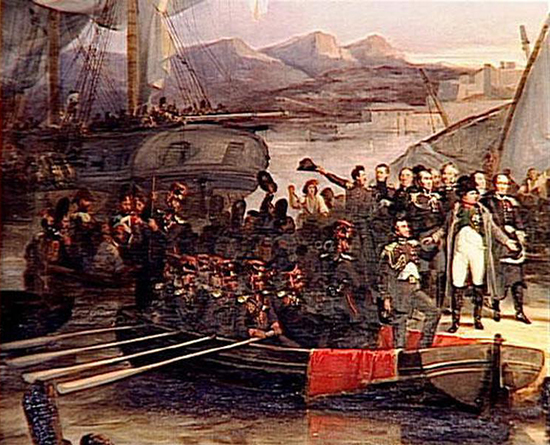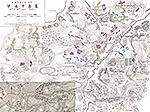|

Refusing to be exiled just yet: Napoleon Leaves
Elba — February 26, 1815
Napoleonic Wars Timeline - Year
1815
Go here for the
 Napoleonic Wars in a
nutshell.
Napoleonic Wars in a
nutshell.
|
|
Image Above
Napoleon leaves Elba in order to
return to France on March 1, 1815
Detail
from the oil on canvas by Joseph
Beaume, 1836
Musée
Naval et Napoléonien à Antibes
|
February 17, 1815
The
 War of 1812 between the U.S.
and Britain ends. It had begun on June 18, 1812. The
War of 1812 between the U.S.
and Britain ends. It had begun on June 18, 1812. The
 Treaty of Ghent that ended this
war was signed on December 24, 1814.
Treaty of Ghent that ended this
war was signed on December 24, 1814.
Today in Washington D.C.,
 U.S. President Madison signs
the treaty and exchanges ratifications with British diplomat
Anthony Baker.
U.S. President Madison signs
the treaty and exchanges ratifications with British diplomat
Anthony Baker.
February 26, 1815
Napoleon leaves Elba.
March 1, 1815
 Napoleon
is back from Elba and arrives on the mainland at Cannes.
Napoleon
is back from Elba and arrives on the mainland at Cannes.
March 11, 1815
The new French Defense Minister
Henri-Jacques-Guillaume Clarke, Duc de
Feltre. He succeeds
Jean de Dieu Soult, Duc de Dalmatie.
March 13, 1815
Thanks to Napoleon's return,
 Louis XVIII
had some really bad days. He packs his bags and escapes to Ghent.
The Louis XVIII
had some really bad days. He packs his bags and escapes to Ghent.
The
 First Bourbon Restoration ends.
First Bourbon Restoration ends.
March 20, 1815
 Napoleon
arrives at Paris.
Napoleon
arrives at Paris.
 Napoleon's Hundred Days begin.
They will end on July 8, 1815.
Napoleon's Hundred Days begin.
They will end on July 8, 1815.
The new War Minister is
Louis-Nicolas Davout, Duc d'Auerstaedt,
Prince d'Eckmuehl (Eckmühl). He replaces
Henri-Jacques-Guillaume Clarke, Duc de
Feltre.
June 9, 1815
 Final Act of the Congress of Vienna.
This act concludes the Congress of Vienna, which had been gathered
since September 18, 1814.
Final Act of the Congress of Vienna.
This act concludes the Congress of Vienna, which had been gathered
since September 18, 1814.
June 18, 1815
 Battle
of Waterloo. Napoleon's swan-song.
Battle
of Waterloo. Napoleon's swan-song.
At around 4 p.m., when the Battle of
Waterloo had been fought since several hours, the
Battle of Wavre begins. It
will end tomorrow. The French, led by Maréchal Emmanuel de Grouchy
and General Gérard, fight the Prussians, led by General von
Thielmann. Between 40,000 and 50,000 troops are involved in this
battle.

Battle of Wavre
June 19, 1815
The
Battle of Wavre ends. It had begun yesterday. With the
end of this battle, the combating of the Napoleonic Wars is over.
However, it will take until November 20, 1815, to have drafted and
signed a suitable peace treaty.
June 22, 1815
For the second time, Napoleon
is forced to abdicate. This time for good. His first abdication had
been announced on April 6, 1814.
Napoleon abdicates in favor of his
four-year-old son, Napoleon François
Charles Joseph Bonaparte, aka
Napoleon II, the King of Rome. Instead, the French will
restore
 Louis XVIII.
Louis XVIII.
June 25, 1815
Napoleon leaves Paris for
Malmaison, then on to Noirot, and finally Rochefort at the west
coast, where he will try to get a passage to America.
Louis XVIII is back in the country. He
will be back in Paris on July 8, 1815.
July 3, 1815
Napoleon arrives at Rochefort,
where he tries to catch a vessel to the United States.
July 7, 1815
The allies enter Paris.
July 8, 1815
 Louis XVIII
returns to Paris. This is the beginning of the Louis XVIII
returns to Paris. This is the beginning of the
 Second Bourbon Restoration. It
will end on August 2, 1830.
Second Bourbon Restoration. It
will end on August 2, 1830.
 Napoleon's Hundred Days end.
They had begun on March 20, 1815. Napoleon's Hundred Days end.
They had begun on March 20, 1815.
July 9, 1815
The new War Minister is
Laurent, Comte Gouvion Saint-Cyr.
He replaces Louis-Nicolas Davout, Duc
d'Auerstaedt, Prince d'Eckmuehl (Eckmühl).
July 15, 1815
Due to the British blockade,
Napoleon is unable to leave for the U.S. Today, he decides to
surrender to the British. He gives himself up to Captain Maitland of
the HMS Bellerophon, in the hopes of being granted exile in
Britain.
July 28, 1815
Napoleon learns that he will be
transported to St. Helena.
September 24, 1815
The new War Minister is
Henri-Jacques Clarke, Duc de Feltre.
He replaces Laurent, Comte Gouvion
Saint-Cyr.
De Feltre will be in office until
September 12, 1817, when Gouvion Saint-Cyr will take back his office
chair.
September 26, 1815
The
Holy Alliance is formed and
signed at Paris by Austria, Russia, and Prussia. This alliance
emphasizes the desire to maintain Christian values in international
politics. Eventually, all European powers will sign this alliance,
except Britain, the Ottoman Empire, and the Pope.
The Napoleonic Wars
end.
November 20, 1815
Second
Peace of Paris, or
Second Treaty of Paris.
The Napoleonic Wars are officially over. Treaties between France and the allies (Great Britain, Austria,
Prussia, Russia) had once again become necessary after Napoleon's
return in March 1815.
In comparison with the First Treaty of
Paris from May 30, 1814, this Second Treaty left France with lesser
territory. French borders are defined as the ones that were in
effect in 1790. The First Treaty gave France the wider borders of
1792.
And another agreement was signed
today, the
Quadruple Alliance, in which Great Britain, Austria,
Russia, and Prussia confirmed their support of each other, their
commitment to implement the Final Act of the Congress of Vienna, and
their mutual interest in a balanced power in Europe. The last point,
of course, put an emphasis on keeping France in its place, now that
the Napoleonic Wars were over.
In 1818 — at the Congress of
Aix-la-Chapelle, which gathered from October 1 to November 15 — this
Quadruple Alliance will admit France as fifth ally and thus become
the Quintuple Alliance.
More History
|